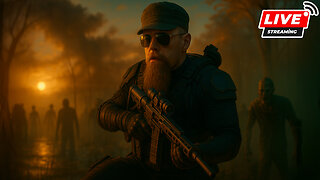Premium Only Content
!['Blitzkrieg' (1979) by Len Deighton [3 of 10]](https://1a-1791.com/video/fww1/13/s8/1/u/8/-/4/u8-4y.qR4e-small-Blitzkrieg-1979-by-Len-Deig.jpg)
'Blitzkrieg' (1979) by Len Deighton [3 of 10]
Had to spit this up. The text is unreadable at resolutions less than 720p, and Rumble will not allow files to be 720p if they are bigger than 90 mins.
Len Deighton’s, 'Blitzkrieg: From the Rise of Hitler to the Fall of Dunkirk' (first published in 1979) is a meticulously researched and sharply written analysis of one of the most dramatic and misunderstood military campaigns of the 20th century. Deighton, best known for his spy fiction such as The Ipcress File and Bomber, brings his novelist’s eye for detail and his historian’s rigor to this non-fiction military study. The result is a compelling and accessible account of how Nazi Germany’s doctrine of lightning war—“Blitzkrieg”—overwhelmed Western Europe in 1940, culminating in the evacuation at Dunkirk.
The central thesis of 'Blitzkrieg' is that the German victories in Poland and France were not the result of sheer brute force or numerical superiority, but rather due to the innovative use of mobile armored warfare and deep operational thinking. Deighton contends that while the term “Blitzkrieg” was often retrospectively applied—more of a media invention than a formal doctrine—the German approach nevertheless marked a revolutionary shift in military strategy. He deftly contrasts the speed, flexibility, and ruthlessness of the Wehrmacht’s armored spearheads with the rigid and outdated thinking of their French and British counterparts.
Deighton’s narrative begins with a chilling account of the rise of Adolf Hitler, framing the political prelude to war in terms that highlight how appeasement, underestimation, and poor strategic judgment enabled Germany’s resurgence. From there, he traces the development of German military thinking from the lessons of World War I to the theorists like Heinz Guderian, who saw in tanks and radio coordination the possibility of a new kind of warfare—fast, mobile, and shockingly effective.
One of the strengths of 'Blitzkrieg' is how it avoids becoming a dry recitation of dates and troop movements. Deighton is deeply interested in personalities, and he sketches sharp portraits of the key figures involved—Guderian, Manstein, Rundstedt, Hitler himself, and on the Allied side, generals like Gamelin and Lord Gort. These human stories reinforce his argument that military success in 1940 was as much a product of institutional adaptability and imagination as it was of equipment and firepower.
Deighton also avoids falling into the trap of glorifying the German military machine. Although he acknowledges the tactical brilliance and technical innovation behind the German campaigns, he constantly reminds the reader of the brutal ideology driving the Nazi state. His account of the invasion of Poland, in particular, does not shy away from the war crimes and atrocities that accompanied it, underlining the moral bankruptcy that lay beneath the Wehrmacht’s operational success.
Where 'Blitzkrieg' truly excels is in its final chapters, dealing with the German invasion of France and the Low Countries. Deighton demolishes the myth that the French army collapsed purely due to cowardice or incompetence. Instead, he paints a picture of structural failure: communications breakdowns, indecisive leadership, and a tragically outdated conception of modern warfare. The rapid German breakthrough at Sedan and the encirclement of Allied forces at Dunkirk are told with clarity and suspense, even though the reader knows the outcome. Deighton’s talent as a storyteller elevates the analysis into gripping historical drama.
Some readers may find that Deighton, while highly readable, occasionally glosses over more technical details or provides a somewhat Anglocentric perspective on events. However, these are minor quibbles in a work that manages to condense a complex, multi-front campaign into a coherent and engaging account. His use of maps and diagrams enhances the clarity of the battles, and his appendices—including orders of battle and timelines—provide useful context for the more technically inclined reader.
In conclusion, 'Blitzkrieg' is both a warning and a study in innovation. Deighton’s central message is that the unexpected victory of the Germans in 1940 was not inevitable—it was made possible by a daring military elite willing to rethink war itself, and by complacent opponents who failed to recognize the transformation underway. For readers seeking to understand not just how Germany conquered Europe so swiftly, but why it was able to do so, 'Blitzkrieg' remains an authoritative and absorbing account. It stands as a bridge between popular history and rigorous scholarship, reminding us that in war, as in politics, speed and imagination can be as decisive as strength.
-
 30:00
30:00
BEK TV
3 days agoGUT HEALTH AND THE POWER OF KIMCHI WITH KIM BRIGHT ON TRENT ON THE LOOS
41.5K4 -
 LIVE
LIVE
IamNibz
7 hours ago $1.04 earned6-7 Minecraft Stream
94 watching -
 36:53
36:53
daniellesmithab
4 days agoSupporting Alberta's Teachers and Students
117K25 -
 1:25:28
1:25:28
VapinGamers
2 hours ago $0.78 earnedTools of the Trade - EP07 Lights, Camera, Go Live with Joker - !rumbot !music
12.3K4 -
 14:38
14:38
Nikko Ortiz
21 hours agoADHD vs Autism
80.9K49 -
 LIVE
LIVE
TonYGaMinG
3 hours ago🟢 INDUSTRIA 2 PLAYTEST / ACTIVE MATTER LATER
127 watching -
 2:43:39
2:43:39
FoeDubb
3 hours ago🏰KINGDOM MENU: 🎮SHORT SATURDAY SESH ON DECK DILLY DILLY!!
16.2K2 -
 2:09:04
2:09:04
GlizzyPrinceChristian
3 hours agoCOD SATURDAYS DIGGY DIGGY DIGGY| We Testing Out This Beta
11.8K2 -
 LIVE
LIVE
MrR4ger
5 hours agoSCARETOBER DAY 4 - AMNESIA: THE BUNKER - ACTIVE MATTER WITH GUMO AN TONY #PARTNERED STREAM
19 watching -
 6:29:28
6:29:28
FyrBorne
16 hours ago🔴Warzone/Black Ops 7 M&K Sniping: From the Zone to Zombs
31K1
